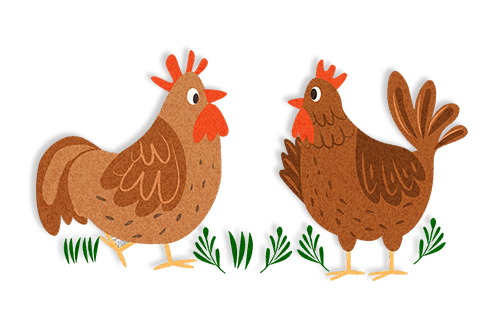

Free-Range Eggs VS. Regular Eggs: Is It Just A Marketing Gimmick?
Free-range eggs often come with big promises - and just as many misconceptions. You may have heard from “they’re just a marketing gimmick” to “all eggs are the same in the end.” But how much of it is actually true?
In this blog, we’re setting the record straight and cracking open the most common myths around free-range eggs.
Questions We’re Answering in This Article
- Is free-range just a marketing gimmick?
- Are free-range eggs more nutritious?
- Do free-range and cage-free mean the same thing?
- Do free-range eggs taste better?
- Is there an environmental benefit to choosing free-range eggs?
- Why does it cost more?
Free-Range Eggs VS. Regular Eggs: Is It Just A Gimmick?
This has been a long going debate. But, the truth is actually quite simple. Free-range eggs come from hens that freely roam outdoors and live as nature intended. They scratch, peck, bask in the sun, while enjoying a healthier, more nutritious diet. This, without doubt, creates a safer and healthier space for hens to lay eggs that are often more nutritious than regular eggs.
So, no, it’s not just a marketing gimmick. The difference is very real.
Benefits Of Free-Range Eggs
Naturally, when hens live healthier lives, it shows in the quality of their eggs. Studies have found that free-range eggs can contain higher levels of omega-3 fatty acids and vitamin D. Simply put, better living conditions can lead to better nutrition.
Since nutrition depends on the hens diet, free-range eggs are often richer in colour, flavour, and overall quality.
Free-Range VS. Cage-Free
The most common misconception out there is that “free-range” and “cage-free” mean the same thing. But no, they are not interchangeable.
Cage-free hens are not confined in cages, but they are still kept indoors in crowded barns. They have room to move around, but they still lack access to the outdoors and natural environments.
However, free-range hens get regular access to the outdoor spaces where they can forage, explore and be in their natural element. They live in a healthier and more stress-free environment.

Does The Taste Really Differ?
Many people do believe that free-range eggs taste better. And there is some truth to it. This isn’t some feel-good assumption because it all comes down to how the hens are raised. Since free-range hens enjoy fresh air and a more varied diet, they tend to lay eggs that are richer in nutrients. The eggs often have brighter yolks and are noticeably fresher in flavour. This is probably nature’s way of rewarding good care!
Are They Gentle On The Planet?
Humans do better when we’re cared for, respected, and given space to grow. So why should it be any different for hens? Free-range farms give hens a more natural and humane life. In return, they give us eggs that are better for our health, and for the planet. This means, less harm to the environment, greater balance in the ecosystem, and sustainable farming that puts care before convenience. It’s a small choice that makes a big impact.
Why It Is Worth It
Ethical farming requires more than just good intentions. It needs space, time, and care to raise hens in a healthy and clean environment. This means larger spaces, more attentive caretaking, and better feed. All of this comes at a higher cost as compared to range mass-scale caged systems.
However, production practices and the hen feed has a significant impact on the nutrients within each egg. So, you’re not just paying for cruelty-free farming, you’re also investing in nutritious food quality and healthy living. It's a small premium that supports a more humane system. And you can feel the difference in every bite.

Free-range is more than just a fancy label. It stands for better living, cleaner nutrition, and a more sustainable way forward. Ready to make the switch? Click here


